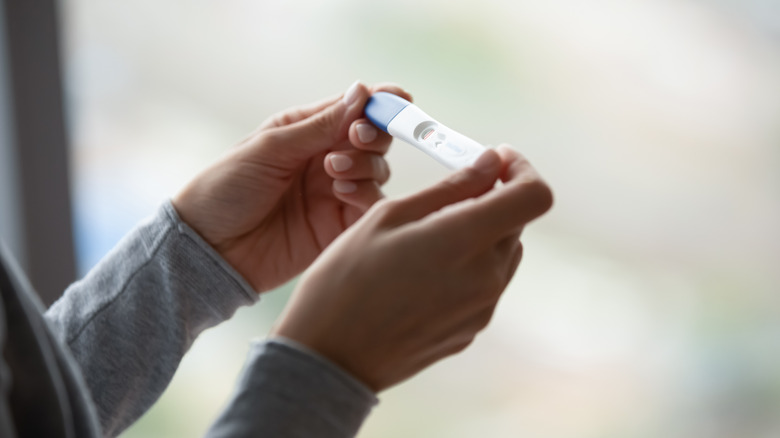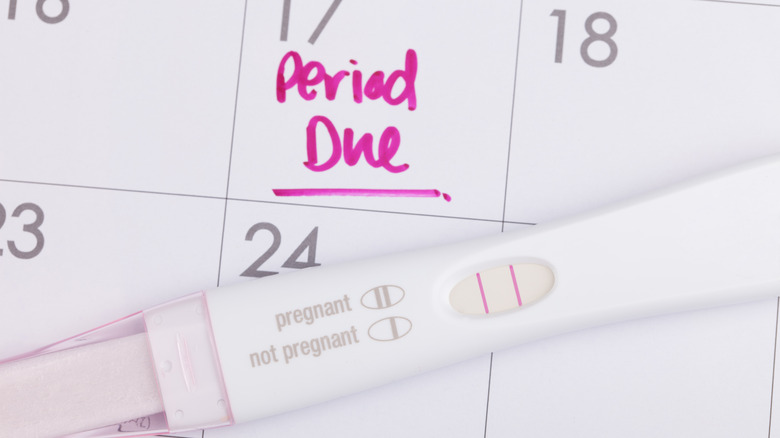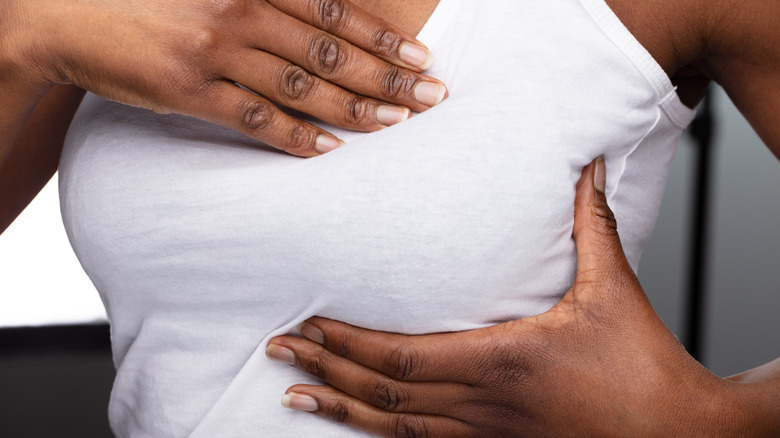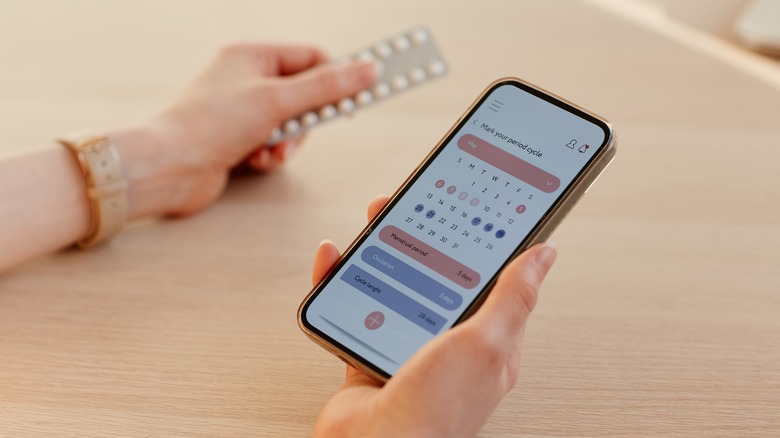Signs You Should Take A Pregnancy Test
If you think you might be pregnant, your first thought might be to grab an over-the-counter pregnancy test from your local pharmacy or grocery store. They're quick, easy, and don't require a prescription. But sometimes you might not feel sure about whether you really need one. Knowing the signs that can indicate pregnancy, even in very early days, can help determine whether or not you should take a pregnancy test.
An at-home pregnancy test works by measuring the levels of human chorionic gonadotropin (hCG) in the urine, according to Cleveland Clinic. This special hormone is only present in the body when a pregnancy is developing. In very early days, the hCG levels may be too low to detect, leading to an inaccurate negative test. As the pregnancy goes on, hCG builds up gradually and can be detected more.
Most over-the-counter pregnancy tests are about 99% accurate when used correctly, which is about the same accuracy as blood tests done in a doctor's office. The best time of day to take a test is first thing after you wake up, because this is when your hCG levels are most concentrated.
Here are five signs that you should take a pregnancy test, according to Healthline.
You miss your period
Most women have a cycle that lasts about 28 days, on average, although some cycles can be irregular. If you notice that it's been longer than a month since your last menstrual period, you could be pregnant and may want to take a test. One of the first signs of pregnancy that many women notice is a missed period.
However, a delayed period can also be due to stress, diet, extreme exercise, or certain medical conditions. Any of these things can affect the timing of your period (via Verywell Health).
Sometimes, implantation bleeding can be mistaken for a period, so you could still be pregnant even if you experience bleeding around the time you're expecting your period (via American Pregnancy Association). This can happen about 10-14 days after conception, when the movement of the fertilized egg in the lining of the uterus causes spotting or light bleeding. About one-third of pregnant women will experience this, and it's usually much lighter than menstrual bleeding.
Your breasts feel sore
As pregnancy develops, hormone levels rise to support the development of the fetus, which includes preparing the body for breastfeeding. As your body produces more and more estrogen and progesterone, blood flow to the breasts also increases. This can cause the breasts to feel tender, the nipples to hurt, and veins under the skin to appear more pronounced. The breasts may feel heavy and swollen, sensitive to the touch, and things like exercise or sleeping on your stomach may become uncomfortable (via Healthline). It's like the breasts are going through a growth spurt as the body prepares for childbirth.
However, breast tenderness can also be a symptom of a menstrual period, so it doesn't always mean you need to take a test right away (via Medical News Today). As estrogen and progesterone drop before a period, the breasts can become sore. This reduction in hormone levels can cause lymph nodes to swell, which can also contribute to breast pain.
You're experiencing cramps
While cramping is common when you're getting your period, it can also be a result of implantation. When an egg is fertilized and makes its way to the uterus, it can cause cramping as it burrows itself into the uterine lining.
Not everyone feels implantation cramping and they don't have any effect on the health of a pregnancy (via Verywell Family). They're similar to mild menstrual cramps in that they're usually dull and achey. Alternatively, they may feel like light twinges. Women also describe them as a prickling, tingling, or pulling sensation. While no one really knows why some people experience implantation cramping and others don't, one theory is that they're felt more in women who are trying to conceive, as they're more likely to be hyper-aware of early signs of pregnancy.
Implantation cramps should be mild. If you're experiencing more severe cramping along with other symptoms like fever, heavy bleeding, or intense pain on just one side, contact your medical provider.
You experience other symptoms
There are some other symptoms of early pregnancy that may cause you to want to take a test. As the pregnancy develops, you may begin to feel nauseous, which is commonly known as morning sickness. This is likely due to hormonal changes, and despite the name, can actually happen at any time of day (via WebMD). Similarly, you might start to feel particularly averse to some foods, even foods that used to be your favorite.
While your body works to support the development of the fetus, you might feel exhausted on a whole new level. This is often due to high levels of progesterone, lower blood sugar and blood pressure, and a boost in blood production.
Healthline notes that as hCG levels climb throughout the first trimester of pregnancy, these symptoms may come on stronger. By the end of the first trimester, at about 12 weeks, these levels will even out, and hopefully your symptoms will, too.
Your method of contraception failed
Unfortunately, no contraceptive method is 100% effective. And if you find yourself experiencing any of the symptoms above, you may want to consider taking a pregnancy test.
Birth control pills, or oral contraceptive pills, are very effective when taken every day, but this may be difficult to remember to do. If you do not always take your pills as directed, you have a 9% chance of getting pregnant. Condoms can also be used incorrectly, or they can break or tear. 18 in 100 women will get pregnant when relying on condoms for birth control (via American College of Obstetricians and Gynecologists).
Alternative methods may be more effective, such as an intrauterine device (IUD) which typically results in less than one in 100 women getting pregnant. The implant is also highly effective. Permanent options are tubal ligation or vasectomy, also known as sterilization (via Planned Parenthood).






